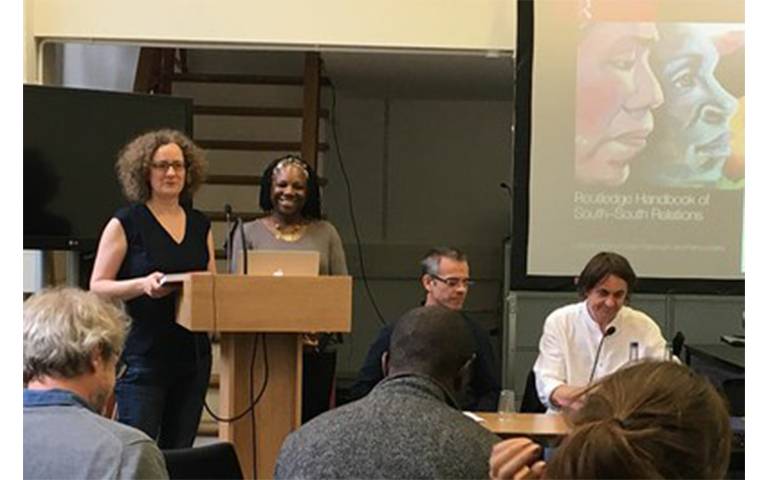Launch of Routledge Handbook of South-South Relations
5 July 2019
Setting agendas for exploring the diversity of the global ‘South’

On 20th May 2019, The Southern Responses to Displacement project launched the Routledge Handbook of South-South Relations, edited by Professors Elena Fiddian-Qasmiyeh (UCL Geography) and Patricia Daley (Oxford), at the UCL Institute of Advances Studies (IAS).
The Handbook explores the diverse definitions of ‘the South’ and how ‘South-South relations’ may be conceptualised and engaged with. It also evaluates the past, present and future opportunities and challenges of South-South cooperation, setting out research agendas for the next 5-10 years.
The Handbook reflects on de-colonial, postcolonial and anticolonial theories and methodologies, exploring the nature of research in and about the global South, and the implications of applying a ‘Southern lens’ across the global South and North alike.
At the IAS event, the editors reflected on the motivation for developing the Handbook. It aims to disrupt current debates and narratives about the South, and explore different ways of “studying, knowing and responding to the diversity that exists in the global ‘South’’’.
Contributing authors provided brief presentations of their respective chapters, which can be heard on the podcast.
- Elena Fiddian-Qasmiyeh: ‘Southern-led responses to displacement: modes of South-South cooperation?’
- Amber Murrey: ‘When spider webs unite they can tie up a lion’: anti-racism, decolonial options and theories from the South.’
- Thomas Muhr: ‘Geographies of South-South Relations and Regionalisation Processes in Latin America-Caribbean’’
- Mario Luiz Neves: ‘South-South Education Relations.’
- Estella Carpi: ‘The ‘need to be there’ North–South encounters and imaginations in the humanitarian economy.’
- Patricia Daley: ‘Toward South–South peace-building.’
In conclusion, Elena noted that the Handbook offers different ways not just to critique existing forms of knowledge and the politics of knowledge production, but also to think about and imagine being in and responding to the world.
For more information on the Handbook, visit the Handbook’s Table of Contents, or, to read extracts from the book, please visit:
- Carpi, E. (2018) Thinking Power Relations across Humanitarian Geographies: Southism as a Mode of Analysis
- Fiddian-Qasmiyeh, E. and Daley, P. (2018) Conceptualising the global South and South–South encounters
- Ould Mohamedou, M. (2019) The Rise and Fall of Pan-Arabism
- Omata, N. (2019) South-South Cooperation in International Organizations: Its Conceptualization and Implementation within UNDP and UNHCR
 Close
Close

